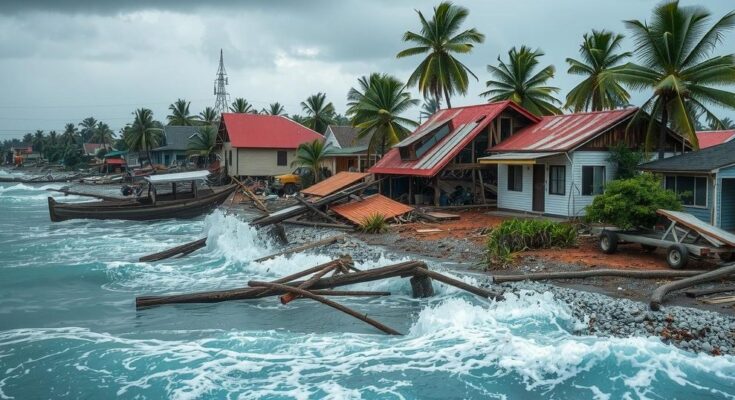Cyclone Chido struck Mayotte on December 15, 2023, causing widespread destruction and leaving residents without essential services. The cyclone is linked to climate change, and rescue efforts face significant challenges. The storm later impacted Mozambique, with 1.7 million people now at risk, attracting international aid pledges while the assessment of damage remains hindered by the presence of undocumented residents.
Cyclone Chido made landfall in Mayotte on December 15, unleashing catastrophic destruction across the region. The cyclone leveled numerous shantytowns, devastated essential infrastructure, including the local airport, and left residents without power, water, or communication services. The unprecedented storm is attributed to rising sea temperatures in the Indian Ocean, a factor linked to climate change. Rescue operations are now encountering significant obstacles due to these conditions, and authorities fear the death toll could be in the thousands as recovery efforts progress.
Following its assault on Mayotte, Cyclone Chido continued its destructive path towards Mozambique, where it has caused additional widespread devastation. The United Nations Office for the Coordination of Humanitarian Affairs (UN OCHA) has issued a grave warning that approximately 1.7 million individuals in the affected region are at considerable risk, highlighting the ongoing humanitarian crisis. Ursula von der Leyen, President of the European Commission, along with the World Health Organization (WHO), has expressed their commitment to providing assistance to the impacted populations. Furthermore, the presence of around 100,000 undocumented residents in the area complicates the full assessment of the damage and the delivery of aid.
The occurrence of Cyclone Chido underscores the increasing frequency and intensity of tropical storms related to climate change. Scientists have indicated that the warming of ocean waters is a critical factor leading to the escalation of such weather events. The impacts of Cyclone Chido exemplify the vulnerabilities of many coastal communities, especially in regions like Mayotte, which lacks robust infrastructure to withstand extreme weather. As global temperatures rise, the consequences of storms like Chido will likely become more pronounced, further straining the resources and capacity of governments and humanitarian organizations, particularly in developing nations.
In conclusion, Cyclone Chido has inflicted severe harm in Mayotte and Mozambique, exacerbating the already critical situation due to climate change. The combined challenges of disrupted communication, limited access to basic services, and the risk to millions emphasize the urgent need for comprehensive humanitarian intervention. The ongoing efforts by international agencies and governments aim to address the immediate needs of those affected, though logistical challenges remain significant in the aftermath of this devastating event.
Original Source: m.economictimes.com




